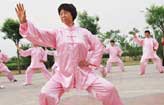Society
Official patronage spurs golf course boom
Updated: 2011-08-14 13:38
(Xinhua)
BEIJING - Local officials seeking profits from land sales are behind China's recent golf course boom, despite a seven-year-old central government ban on the development of new courses, industry insiders say.
The officials, who are often entertained by businessmen at these luxurious facilities, become loyal patrons and backers for further developments, they say.
The country has seen the development of 430 new golf courses since the State Council, or China's Cabinet, ordered the ban in 2004. This brings the number of golf courses in China to about 600, most of which are located in the suburbs of the country's major cities.
Most of the new golf courses were developed under the disguise of "eco-tourism projects" or "property development" to circumvent the ban, said Feng Ke, director of Peking University's real estate finance center.
Beijing is home to more than 60 golf courses, about half of which were built after 2004. Most are located near top-end villas and resorts. Only a few of the golf courses were built in compliance with current policies, Feng said.
It costs nearly 1 million yuan ($156,000) to purchase a lifetime membership at Beijing's Qinghewan Golf Course, a sprawling 36-hole golf complex. However, the course has yet to secure approval for development from the municipal government, according to the Beijing Municipal Bureau of Land and Resources's website.
Chen Guoqiang, vice chairman of the China Real Estate Society, said local governments have turned a blind eye to irregularities in development approvals or are even involved in the illegal developments themselves.
Local governments' revenues from land sales are lucrative, while the development of high-end facilities like golf courses also pushes up property prices in surrounding areas, Chen said.
These numbers are important for fiscally-stretched local governments, as land sales are a vital source of revenue for them, he said.
"Many local officials are important patrons for these golf courses," he added.
Insiders say that the country's businessmen are turning to golf as a popular way to socialize with officials as they seek alternatives to extravagant banquets and nightclubs.
Golf course employees told Xinhua that they often see officials spending hours swinging golf clubs and chatting with businessmen, despite never paying a dime for the privilege. Some believe that corrupt deals take place on the greens.
"It is such a crime for officials to seize lands from farmers to build golf courses, which only the privileged may enjoy," a netizen using the screenname "gfhjhlk" wrote on sina.com, a well-known Chinese web portal.
Local media in Beijing have reported that the city's golf courses consume about 40 billion liters of water annually. A golf course management expert who declined to be named said that a golf course may use more water than a farm of the same size.
The Beijing Water Authority could not be reached for comment.
Chen said that several officials have been sacked or penalized for lax supervision over golf course development over the years, but that enforcement of the regulations needs to be further strengthened.
"The officials know about every backdoor deal. Supervision should be tightened," Chen said.
E-paper

Going with the flow
White-collar workers find a traditional exercise helps them with the frustrations of city life
The light touch
Long way to go
Outdoor success
Specials

Star journalist remembered
Friends, colleagues attended a memorial service to pay tribute to veteran reporter Li Xing in US.

Robots seen as employer-friendly
Robots are not new to industrial manufacturing. They have been in use since the 1960s.

A prosperous future
Wedding website hopes to lure chinese couples
